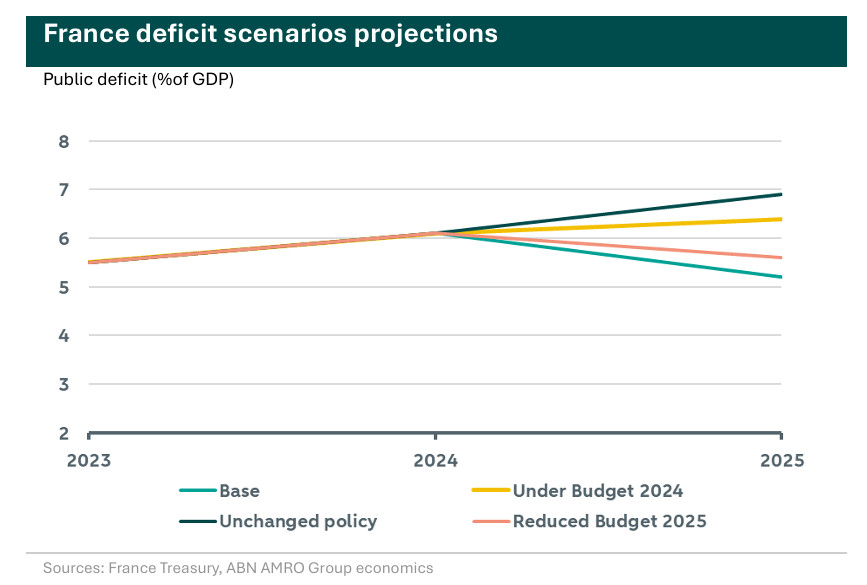Euro Rates Watch - France political turmoil: Navigating Potential Collapse French Government


France is currently facing a significant political crisis that threatens the stability of its government and the approval of the 2025 Budget. As negotiations intensify, the far-right opposition, led by Marine Le Pen, has expressed willingness to support a no-confidence vote against the government if certain budgetary demands are not met. This precarious political landscape has heightened concerns about the country's fiscal outlook, with the likelihood of the public deficit exceeding the previously announced 5% deficit for 2025. The ongoing turmoil suggests that even if immediate government collapse is avoided, the French political environment will likely remain volatile, impacting economic growth and market confidence.
All of this assumes that the government will manage to remain in power until the adoption of the 2025 Budget, which seems increasingly uncertain by the day. Today, the highly sensitive Social Security Budget is up for a vote, with the likely prospect of being adopted via Article 49.3 (a constitutional bypass the government can use without the parliament) due to the lack of a clear parliamentary majority. This would expose the government to a motion of no confidence that could be considered as early as Wednesday. The far-right political leader has already stated that the party would vote the no-confidence if the text remains unchanged and if the government decides to adopt it via the Article 49.3. In such scenario, the current government would be dismissed and the President would need to nominate a new Prime Minister to form a new government. The risk being that the 2025 Budget will miss the deadline and fail to be adopted.
What does this mean for the 2025 public deficit?
Regardless of the outcome, we believe the deficit is likely to exceed the 5% previously announced by Michel Barnier a few months ago. Even if the Prime Minister manages to negotiate with the far-right opposition to prevent a government collapse in 2024 and facilitates the adoption of the 2025 budget, this will likely result in reduced government spending cuts. Possibly resulting in total cuts of around EUR 40 billion next year. Consequently, we anticipate a public deficit of 5.6% in 2025, instead of the 5% projected with EUR 60 billion in cuts.
If the no-confidence vote succeeds before the budget is approved, a "special law" might be enacted, allowing Parliament to apply the 2024 budget instead. This scenario would also increase the 2025 deficit. Firstly, economic growth is likely to slow due to political uncertainty. Secondly, some fiscal consolidation measures planned for next year’s budget would be abandoned. Currently, the budget plan is composed of approximately EUR 30 billion in tax increases, along with other cost-saving measures (still un-estimated). Despite potential savings of around EUR 15 billion on the state budget by maintaining the 2024 budget allocations for ministries next year, it would not suffice to offset the lack of fiscal consolidation. Based on our estimate, the deficit could still be close to where it is now at around 6.4%. French budget officials have emphasized that "in the absence of budgetary texts, the public deficit will far exceed 5%." Previous budgetary notes indicated that with unchanged fiscal policy, the French Treasury projected a deficit of 6.9% in 2025.
As discussed in our Fixed Income outlook, even if the government is not brought down this week, we believe it is only a matter of time before it happens. In our base scenario, we anticipate a vote of no confidence to be adopted either this week or in H1 2025, leading to the establishment of a new government. However, given the deeply divided French political landscape, there remains a high probability that a new center-right or center-left government nomination by Macron would still be too weak to last until 2027. This means a new government would still be likely subject to no-confidence votes by the opposition, ultimately forcing the President to call for new legislative election in H2 2025. This suggests that French government bonds are likely to remain under pressure, oscillating between the 80-100 basis point level. Given the deep political divisions, even a new election or a new government appointed by Emmanuel Macron may not provide sufficient stability to reassure businesses and investors about the French economic situation.
